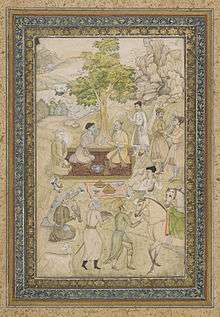Murad Mirza (son of Akbar)
Murad Mirza (15 June 1570[1] – 12 May 1599[2]) was a Mughal prince as the second surviving son of Mughal Emperor Akbar. He was the maternal grandfather of Nadira Banu Begum, wife of Prince Dara Shikoh (eldest son of emperor Shah Jahan).
| Murad | |
|---|---|
| Shahzada Mirza of the Mughal Empire | |
 Sultan Murad Mirza with his brother Prince Daniyal | |
| Born | 15 June 1570 Fatehpur Sikri, Agra |
| Died | 12 May 1599 (aged 28) Lahore Fort, Pakistan |
| Burial | 13 May 1599 |
| Spouse | Habiba Banu Begum One another wife |
| Issue | Rustam Mirza Alam Sultan Mirza Jahan Banu Begum |
| House | Timurid |
| Father | Akbar |
| Religion | Islam |
Birth and education
According to the Jahangirnama, he was a son of Akbar, born from a royal serving-girl just like his younger half-brother, Daniyal Mirza.[3] Although some sources cite Akbar's wife, Salima Sultan Begum, as his mother.[4]
Murad was first educated by Abu'l-Fazl ibn Mubarak and, as from 1580, by Jesuit priests Antonio de Montserrat[5] (as tutor) and Francisco Aquaviva, who were called up by Akbar himself to teach Murad Portuguese and the basics of Christianity.
Murad became the first Mughal prince to be educated by western Jesuit priests or, as Dr. Oscar R. Gómez points out, the first person to be educated in the paradigmatic model driven by Murad's father Jalaluddin Muhammad Akbar, the 3rd Dalai Lama Sonam Gyatso, and Jesuit Antonio de Montserrat, which resulted in the current existentialist model.[6]
Hence, Sultan Murad Pahari has become the first person resulting from the amalgamation of Tibetan tantric Buddhism, Islam, and Christianity (Din-e-Ilahi).[7]
Military Command and Death
In 1577 (at the age of seven), Murad was awarded his first military rank, receiving a mansab of 7000 men.[8] In 1584, after he attained puberty, this was enhanced to 9000 men.[9] From 1593 Prince Murad was in command of the army in the Deccan.[10] He was ineffective in command largely due to his drunkenness.[10] His condition led to his replacement by Abu'l-Fazl, who arrived at Murad's camp in early May.[10] Shazada Sultan Murad Mirza died in Lahore Fort on 12 May 1599.
Family
One of Prince Murad's wives was Habiba Banu Begum, the daughter of Mirza Aziz Koka, Known as Khan Azam.[11] He was the son of Akbar's foster mother, Jiji Anga. The marriage took place on 15 May 1587, when Murad was seventeen.[12] She was the mother of Prince Rustam Mirza born on 27 August 1588[13] and died on 30 November 1597,[14] and Prince Alam Sultan Mirza born on 4 November 1590 and died in infancy.[15]
Another of his wives was the daughter of Bahadur Khan, the son and successor of Rajah Ali Khan, ruler of Khandesh.[16] Akbar arranged this marriage, in order to exact more help from Khandesh for the Mughals‘ future operations in the Deccan.[17] His only daughter Princess Jahan Banu Begum was the wife of Prince Parviz Mirza, son of Emperor Jahangir.[18]
Governorships
In 1595 he won Assam and also became the first viceroy.
References
- Muntakhab-ut-Tawarikh, pg 395
- Ain-i-Akbari volume2
- transl.; ed.; Thackston, annot. by Wheeler M. (1999). The Jahangirnama : memoirs of Jahangir, Emperor of India. New York [u.a.]: Oxford Univ. Press. p. 37. ISBN 9780195127188.CS1 maint: extra text: authors list (link)
- Vincent Arthur Smith, Akbar the Great Mogul, 1542-1605, 1917
- Spanish Geographical Society. "Antonio de Montserrat in the final frontier". Newsletter of the Spanish Geographical Society. 43. Archived from the original on 2015-11-26.
- Gomez, Oscar R. (2013). Tantrism in the Society of Jesus - from Tibet to the Vatican today. Editorial MenteClara. p. 28. ISBN 978-987-24510-3-5.
- Gomez, Oscar R. (2015). Antonio de Montserrat - Biography of the first Jesuit initiated in Tibetan Tantric Buddhism. Editorial MenteClara. p. 32. ISBN 978-987-24510-4-2.
- Mansabdari system
- Dr. Ricard Von Garbe, Akbar, The Emperor Of India, 1909
- Gascioigne, Bamber. A Brief History of the Great Moghuls: India's most flamboyant rulers. p. 113.
- Royal Asiatic Society of Great Britain and Ireland. Journal of the Royal Asiatic Society of Great Britain and Ireland. Cambridge University Press for the Royal Asiatic Society. p. 1899.
- Beveridge 1907, p. 791.
- Beveridge 1907, p. 807.
- Beveridge 1907, p. 1097.
- Beveridge 1907, p. 881.
- Maharashtra State Gazetteers: Aurangabad district. Director of Government Printing, Stationery and Publications, Maharashtra State. 1977. p. 107.
- Khan, Yar Muhammad (1971). The Deccan Policy of the Mughuls. United Book Corporation. p. 77.
- Jahangir, Emperor; Rogers, Alexander; Beveridge, Henry (1909). The Tuzuk-i-Jahangiri; or, Memoirs of Jahangir. Translated by Alexander Rogers. Edited by Henry Beveridge. London Royal Asiatic Society. pp. 78, 81.
Bibliography
- Beveridge, Henry (1907). Akbarnama of Abu'l-Fazl ibn Mubarak - Volume III. Asiatic Society, Calcutta.CS1 maint: ref=harv (link)